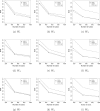Why match? Investigating matched case-control study designs with causal effect estimation
- PMID: 20231866
- PMCID: PMC2827892
- DOI: 10.2202/1557-4679.1127
Why match? Investigating matched case-control study designs with causal effect estimation
Abstract
Matched case-control study designs are commonly implemented in the field of public health. While matching is intended to eliminate confounding, the main potential benefit of matching in case-control studies is a gain in efficiency. Methods for analyzing matched case-control studies have focused on utilizing conditional logistic regression models that provide conditional and not causal estimates of the odds ratio. This article investigates the use of case-control weighted targeted maximum likelihood estimation to obtain marginal causal effects in matched case-control study designs. We compare the use of case-control weighted targeted maximum likelihood estimation in matched and unmatched designs in an effort to explore which design yields the most information about the marginal causal effect. The procedures require knowledge of certain prevalence probabilities and were previously described by van der Laan (2008). In many practical situations where a causal effect is the parameter of interest, researchers may be better served using an unmatched design.
Figures





References
-
- Bembom O, Peterson ML, Rhee S-Y, Fessel WJ, Sinisi SE, Shafer RW, van der Laan MJ. Biomarker discovery using targeted maximum likelihood estimation: Application to the treatment of antiretroviral resistant hiv infection. Technical Report 221, Division of Biostatistics, University of California, Berkeley. 2007 - PMC - PubMed
-
- Breslow NE, Day NE. Statistical Methods in Cancer Research: Volume 1 – The analysis of case-control studies. International Agency for Research on Cancer; Lyon: 1980. - PubMed
-
- Breslow NE, Day NE, Halvorsen KT, Prentice RL, Sabal C. Estimation of multiple relative risk functions in matched case-control studies. Am J Epid. 1978;108(4):299–307. - PubMed
Publication types
MeSH terms
Grants and funding
LinkOut - more resources
Full Text Sources
Other Literature Sources
Medical
